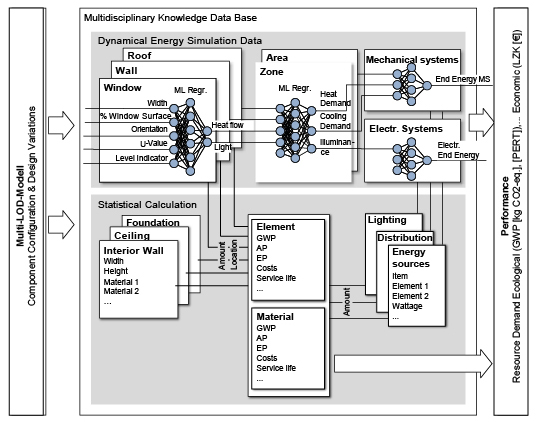EarlyBIM 2
Subproject 4: Knowledge database and machine learning assistance for performance-oriented construction

Project duration
06.2020 until 05.2023
Funding organization
Deutsche Forschungsgemeinschaft (DFG, German Research Foundation) – Project number 271444440
Project partners
RUB (Ruhr-University of Bochum)
Chair of Computing in Engineering, Prof. Dr.-Ing. Markus König (Speaker)
University of Duisburg-Essen
Institute of Concrete Structures, Prof. Dr.-Ing. Martina Schnellenbach-Held
TU Berlin
Department of Digital Architecture and Sustainability, Prof. Dr.-Ing. Philipp Geyer
TUM
Chair of Computational Modeling and Simulation, Prof. Dr.-Ing. André Borrmann
Chair of Architectural Informatics, Prof. Dr.-Ing. Frank Petzold
Summary
The project is part of the research group FOR 2363: Evaluation of building design variants in early design phases on the basis of adaptive detailing strategies.
Subproject 4 at the Institute of Energy Efficient and Sustainable Design and Building deals with the development of a component-based parametric knowledge database, sampling and multi-criteria influence analyses, and manages the case studies.
The knowledge database „Grey Energy” for building components was constructed as a prototype in the first phase of the project. Through the Integration of other disciplines (building ecology and building economics) and technical components (e.g. building mechanical systems) it will be developed in the Multi-LOD-Modell to a design supporting database in cooperation with the other sub-projects. As a next step, detailing suggestions will be provided. Based on boundary conditions (e.g. construction type, geometry, energy standard) chosen by the designer, aggregation levels of the components will be generated to provide results for the ecological and economic performance.
The sensitivity analyses, which was conducted in the first phase on the basis of sampling continuous parameters, will be extended to a decision-based design space exploration and multi-criteria influence analysis. In the performance results, interesting detailing options considering uncertainties will be identified manually in relation to economic and ecological properties as well as architectural qualities. These options will be formalized as strategies consisting of combinations of model variations and parameters (value ranges, performance requirements). As such, results for the detailing strategies will be obtained and made available for the other sub-projects.
For the evaluation of the methods developed by the group, the chair ENPB provides real-life architectural projects as case studies. These serveas a basis for a prototypical implementation of the system developed in the research group.
Project Team
Patricia Schneider-Marin, Johannes Staudt, Manuel Margesin, Chujun Zong